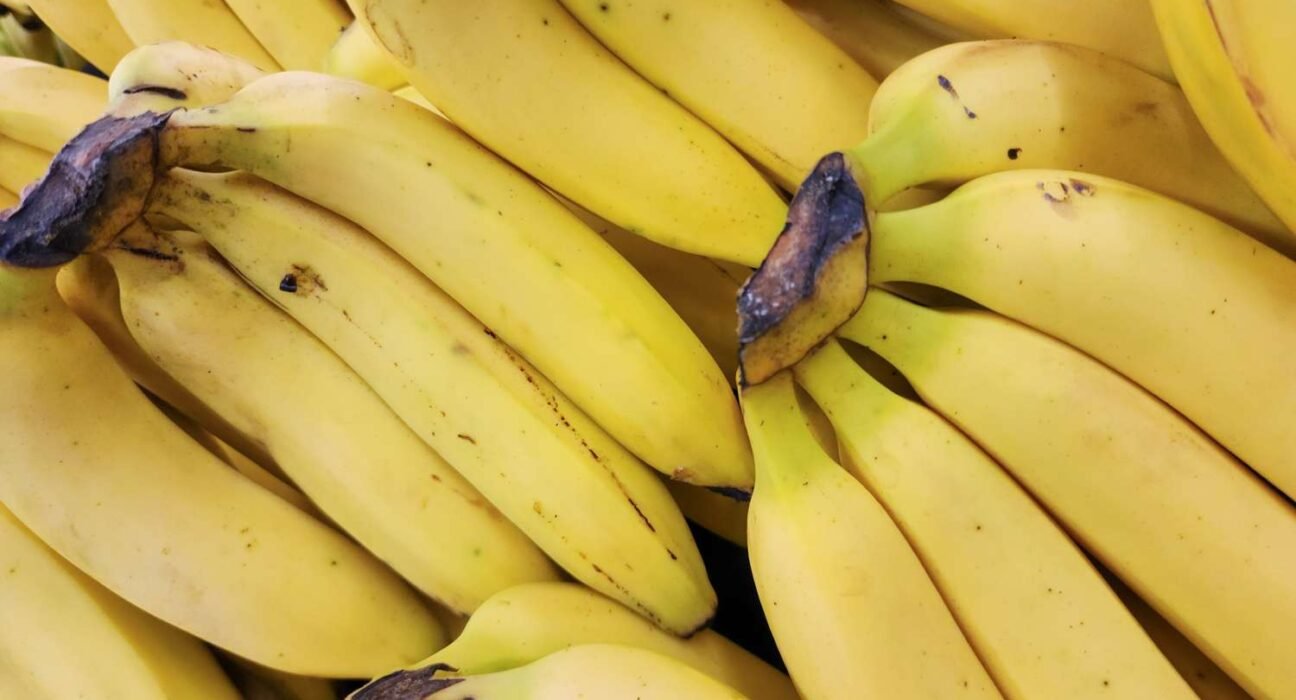Bananas are a good source of dietary fiber, vitamins, and minerals (including potassium) that promote gut health. You can include this versatile fruit in your diet in many ways.
Jump to Key Takeaways.
1. You Increase Gut-Friendly Fiber Intake
Fiber is important to overall health and digestion, but most people do not eat enough fiber every day. Most people should eat between 28 and 34 grams of fiber a day. With approximately 5 grams of fiber, a banana is a good choice for increasing daily fiber intake.
Fiber also helps keep stools soft and easy to pass, which may help with both constipation and diarrhea.
2. You Improve Your Gut Microbiome
Bananas contain a type of insoluble prebiotic fiber called inulin. Prebiotics are a type of fiber that is not completely digested in the gut, but is fermented there. Prebiotics serve as food for the beneficial bacteria in the gut microbiome (the community of microbes in the gut).
Supporting the microbiome helps balance blood sugar levels, enhances nutrient absorption, reduces the risk of colon cancer, and supports the immune system.
The antioxidants in bananas also support the microbiome. Antioxidants neutralize unstable free radicals naturally produced in the body. Free radicals cause oxidative stress, which damages DNA.
3. You Replenish Potassium for Hydration and Other Functions
Bananas contain potassium, which is a type of electrolyte. Electrolytes are charged minerals that help the body maintain hydration (water balance) and other functions. Other electrolytes include sodium (salt), magnesium, and calcium.
Electrolytes are lost in sweat and urine. Eating a banana helps replenish potassium. Potassium balance is crucial for hydration and nerve and muscle function, all of which are essential for proper digestion.
4. You Manage Indigestion or Upset Stomach
Bananas are a home remedy for stomach upset and diarrhea. Bananas are easy to digest, and they also help the stomach produce more mucus. The mucus coats the inside of the stomach, protecting the lining from irritants.
5. It Helps You Feel Full When Managing Weight
Bananas are relatively low in calories (113 per banana) and contain dietary fiber and resistant starch. The fiber and starch help you feel full, which is key to maintaining a healthy weight. Green bananas contain more resistant starch. Yellow bananas contain more sugar because starch is converted to sugar during ripening.
A banana can be part of a weight management eating plan, but eating more than one or two a day could add too many calories and sugar to the diet, so balance them with other healthy foods.
6. You Get an Energy Boost
Carbohydrates are quickly broken down and used by the body for energy, within about 30 minutes. The 27 grams of carbohydrates in a banana include 18 grams of sugars that provide a quick energy boost. Plus, they contain vitamins and minerals that support energy production and use.
What’s in a Banana?
One medium banana (about 115 grams) includes:
- Calories: 113 kilocalories (kcal)
- Carbohydrates: 26 grams (g)
- Fiber: 5 g
- Sugars (fructose, glucose, and sucrose): 18 g
- Protein: 0.9 g
- Fat: 0.3 g
- Calcium: 6 milligrams (mg}
- Potassium: 375 mg
- Magnesium: 32 mg
- Manganese: 0.3 mg
- Folate: 16 micrograms (mcg)
- Vitamin B6: 0.24 mg
- Vitamin C: 14.1 mg
- Water: 87 g
Who May Need to Limit or Avoid Bananas?
For many people, bananas are a great addition to the diet. However, there are some reasons why bananas might need to be avoided.
Irritable bowel syndrome: In irritable bowel syndrome (IBS), people experience chronic abdominal pain and constipation and/or diarrhea. They may follow a low-FODMAP (fermentable oligosaccharides, disaccharides, monosaccharides, and polyols) diet to treat the condition. On this diet, bananas might be restricted, as ripe bananas are high in FODMAPs. A firm banana, which is less ripe, is low in FODMAPs.
Medications that interact with bananas: People taking certain medications may need to limit bananas or other foods containing potassium. Some blood pressure drugs can raise the potassium levels in the blood too much, including:
- Angiotensin-converting enzyme inhibitors (ACE inhibitors)
- Angiotensin II receptor blockers (ARBs)
Banana allergy: Bananas are not a major food allergen. However, between 0.04% and 1.2% of people are allergic to bananas. People with a banana allergy often have allergies to other foods, latex, ragweed, or pollens.
Migraine: People with migraines may find that certain foods can trigger a headache, including bananas.
How Should You Include Bananas in Your Diet?
Bananas are a convenient fruit that can be peeled and eaten as a snack or dessert. You can also enjoy them in other ways:
- Added to pancake batter
- Baked into bread, muffins, or cookies
- Blended into a smoothie
- In a sandwich with a nut butter
- Mashed up as a replacement for butter or oil in a recipe for baked goods
- On top of cereal, oatmeal, or yogurt
- Sliced and eaten with a topping, such as chocolate or a nut butter
- Sliced and baked to make banana chips
As bananas provide little protein, eating them with a protein source, such as nut butter, can provide a more balanced snack or small meal.
Key Takeaways
- Bananas are a good source of fiber, vitamins, and minerals, especially potassium.
- Bananas are beneficial for overall health and digestion, but moderation is essential to avoid excessive consumption of calories, carbohydrates, and sugars.
- People taking certain medications for high blood pressure, who experience migraine headaches, or who are following a low-FODMAP diet for IBS may want to avoid or limit bananas.

